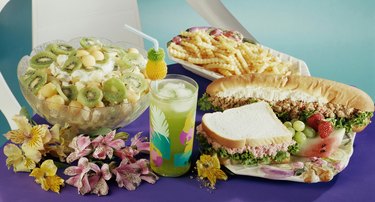
Eating a healthy diet is important to control weight and prevent or manage many chronic conditions. However, eating a healthy diet means planning out meals and taking to time to shop to compare products. Sometimes eating healthier also means spending more money at the grocery store, and all of the above, may deter some from eating as healthy as they should. If you are having trouble eating healthy, talk to a registered dietitian who can help to form a plan that will fit into your budget, while reducing your risk of disease.
Changing Established Habits
Video of the Day
Eating is not just about providing the body with the calories and nutrients it needs, and certain eating behaviors may have been established during childhood. Eating provides a way to socialize with others, certain foods may be associated with positive emotions and sometimes food is used to deal with underlying emotions such as boredom, anxiety, loneliness and others. The Centers for Disease Control and Prevention recommends keeping a food journal of what and why you eat so problems can be identified. Start by changing thought patterns such as having to always clean your plate and not waste food, eating due to pressure from friends or family members, eating while performing other tasks, or eating because it is comforting. All of the above can lead to overeating and poor food choices. Change your habits slowly by picking one trigger at a time and develop alternative ways of thinking and coping.
Video of the Day
Lack of Time
A hectic lifestyle and eating on the run can lead to unhealthy food choices. Grabbing whatever is available whenever you have time can set you up for bad eating behaviors. Go through your cabinets and the refrigerator to get rid of junk food and replace it with healthier options. Think ahead and buy meats and vegetables that are already cut up to reduce prep time. Go for fruits or vegetables that are canned in their own juice or water, without any sugar or salt added. Heat, light and air can all rob fruit and vegetables of their nutrients, so buying canned or frozen versions that are packed right after being picked, often contain more nutrients then fresh foods that have been shipped, according to the Cleveland Clinic. When cooking, make larger portions and freeze some of it so you have meals ready to heat up. Some grocery stores offer online shopping and delivery to your home, saving you a trip to the store. These things can help you to save time and energy so that eating healthier is easier.
Too Much Information
The news, magazines and Internet are full of information on what eating healthy entails, and it can be confusing to know what is true and what is not. There are so many diet plans that claim to help you lose weight quickly or prevent and manage heart disease and other conditions. In general, Americans eat too many calories and high amounts of unhealthy fats, sugar, salt and refined grains. Most do not get enough potassium, fiber, calcium, vitamin D and healthy fats, reports the United States Department of Agriculture. The goal is to eat a well-balanced diet that contains three to five servings of fruits and vegetables a day, and one serving is just 1 cup. Read nutrition labels and aim to get between 25 to 35 g of fiber and 1,500 mg or less of salt each day. Fat consumption should make up no more than 30 percent of your total calorie intake and most of that should come from unsaturated fats. It can be difficult and time-consuming to plan out a menu, but there are free websites that can help you get started.
Cost
Junk food is often less expensive than healthy food, and when you are on a tight budget, healthy eating can be challenging. The Mayo Clinic suggests learning to stock your pantry with essentials and to make a grocery list before you head to the store. Look through supermarket circulars, clip coupons and find the sales so you are prepared and have a list to stick to. Try having one or two meatless meals each week and go for a vegetable, bean or whole-grain based dinner as meats can be expensive. Check to see if your grocery store has a shopper's card where you earn points that can be turned into savings. All of the above can add up to some real savings and help you to eat healthier.